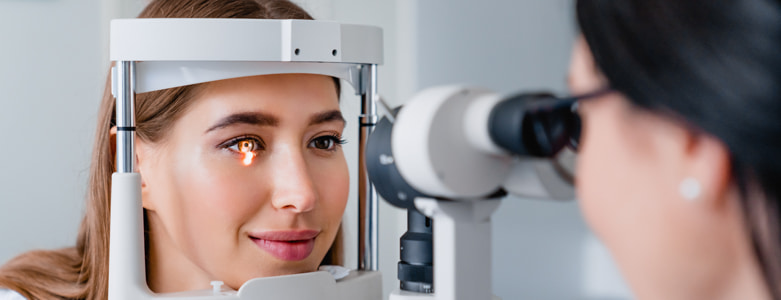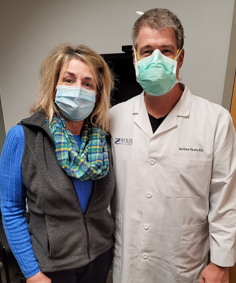
February 18, 2021
Not a candidate for LASIK? Hear how Wolfe Eye Clinic helped Mary find better vision with refractive lens exchange!
Each year, thousands of patients undergo LASIK laser eye surgery in Iowa at Wolfe Eye Clinic with plans to eliminate or reduce their need for contact lenses and eyeglasses. LASIK is one of the most well-known and safest surgeries around, but what are your options if you don’t qualify for LASIK? Rest assured at Wolfe Eye Clinic we offer other options for refractive surgery that could be a better solution for your specific eyes. Even better, we review all your options with you and ensure we recommend the best solution to achieve your vision goals. One of those options might be refractive lens exchange (RLE), also known as clear lens exchange, just like our recent patient, Mary, from Johnston, Iowa.
“If you are looking for an alternative to wearing glasses all or part of the time, I would highly recommend a visit to Wolfe Eye Clinic!"
-Mary from Johnston, Iowa
Mary’s Refractive Lens Exchange Experience
Mary is a Wolfe Eye Clinic patient who originally called with interest in LASIK eye surgery. Like many patients, Mary had a type of refractive error known as hyperopia that made her distance vision blurry and required her to wear glasses or contacts. She was interested in a way to help correct her vision without contacts or glasses and was curious if she might be a candidate for LASIK. She also had difficulty seeing up-close and began to need reading glasses later in life. Motivated to get rid of her glasses and “looking for some answers in how to help both near and far sightedness”, Mary called Wolfe Eye Clinic and scheduled a free LASIK eye surgery evaluation in Des Moines.
 When Mary came in for her LASIK consultation in Des Moines at Wolfe Eye Clinic, she started the day with our experienced ophthalmic technicians performing advanced testing and an evaluation of Mary’s corneal structure. Once testing was completed, she met with Dr. Matthew Rauen, a corneal specialist and Iowa LASIK and refractive surgeon to discuss her vision goals and review her evaluation results.
When Mary came in for her LASIK consultation in Des Moines at Wolfe Eye Clinic, she started the day with our experienced ophthalmic technicians performing advanced testing and an evaluation of Mary’s corneal structure. Once testing was completed, she met with Dr. Matthew Rauen, a corneal specialist and Iowa LASIK and refractive surgeon to discuss her vision goals and review her evaluation results.
Unlike many other providers, LASIK consultations at Wolfe Eye Clinic are comprehensive. Not only is LASIK candidacy considered but alternatives to LASIK such as photorefractive keratectomy (PRK), implantable contact lens (ICL) and refractive lens exchange are considered as well. While a patient may not qualify for LASIK, they may qualify for an alternative refractive procedure or prefer the additional vision benefits that implantable contact lenses or refractive lens exchange offers. It’s important to know all your options, and safe options, when considering a way to be less reliant on glasses or contacts at any age!
When we recently chatted with Mary after her surgery, she said, “I had not heard of a clear lens exchange before visiting Dr. Rauen at Wolfe Eye Clinic. The process was very smooth… not a day goes by that I am not grateful for having had the surgery!”
Patients are often pleased and relieved to hear there may be alternative options to LASIK eye surgery in Iowa when LASIK is not right for them.
What is refractive lens exchange (clear lens exchange)?
Similar to LASIK eye surgery, refractive lens exchange is a type of refractive surgery that treats nearsightedness (myopia), farsightedness (hyperopia) and astigmatism. While technically advanced precise lasers are used during LASIK to reshape the cornea, the outermost portion of the eye, refractive lens exchange surgically removes and replaces your eye’s natural lens with an artificial lens known as an intraocular lens (IOL). This process is similar to cataract surgery.
Refractive lens exchange offers an additional benefit to patients that LASIK surgery cannot by treating presbyopia through technologically advanced intraocular lenses. Presbyopia is natural with age, usually beginning around age 40 and causes the eye’s lens to become less flexible. Like most patients, Mary began to notice her up-close vision progressively getting worse, consistent with symptoms of presbyopia and the loss of lens elasticity. This vision change required Mary to buy some reading glasses or “readers” in order to see up-close in addition to needing glasses to see in the distance. Now, weighed down by eyeglasses to see at all distances, Mary desired freedom from glasses all together.
Because refractive lens exchange replaces the eye’s natural lens with an artificial intraocular lens, the procedure is also able to treat presbyopia. Wolfe Eye Clinic’s selection of advanced intraocular lenses offers patients the ability to see at multiple distances including near, intermediate, and far distances. This advanced technology helps qualified patients see up-close and read clearly again as well as see at a range of distances.
This solution was perfect for Mary because she wanted the benefits of LASIK, but because LASIK does not correct for presbyopia, having refractive lens exchange was a better solution for her vision goals.
“The benefits of the surgery are the fact that I have not put my glasses on since the first day I had surgery. Not worrying about wearing glasses to see near or far is amazing," said Mary, Johnston, IA refractive lens exchange patient, four months after surgery.
If you are looking for freedom from your contact lenses or glasses and are unsure of your options, give Wolfe Eye Clinic’s LASIK department a call at (833) 532-8809 or request information online here. Our LASIK coordinators are here to help you start the process, answer questions and schedule appointments!
As with Mary, the first step is often scheduling a free LASIK evaluation with one of our Iowa LASIK surgeons across the state in Ames, Cedar Falls, Des Moines, Fort Dodge, Hiawatha (Cedar Rapids), Iowa City, Marshalltown, Ottumwa, Pleasant Hill or Waterloo. There are many variables that are considered when determining if you’re a good LASIK or refractive surgery candidate including your corneal thickness, overall eye health and vision stability. Your LASIK surgeon will help determine what refractive surgery options are best for you and your vision goals.